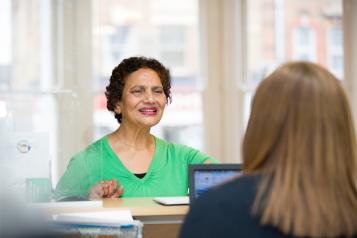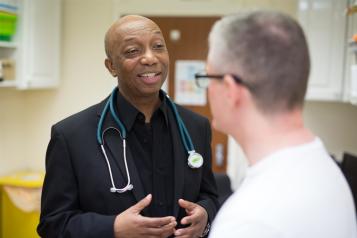Report Launch at Wood Green Library - Barriers to GP Registration in Haringey

Over 40 people attended the event at Wood Green Library and online. They heard about our findings on people from migrant communities and those affected by homelessness, who have faced multiple barriers to access GP services.
In research by phone and in-person we found most surgeries would not register a new patient without ID or proof of address, even though this is against NHS guidance.
39 surgeries were called in the mystery shopping telephone survey
- 24 out of 39 said they needed to see proof of address.
- 30 out of 39 surgeries said they needed to see ID.
39 surgeries were visited in person*
- 20 out of 37 required proof of address.
- 20 out of 37 required ID.
(*One would not answer questions, one was closed, so 37 were surveyed).
We hope that this report will help Haringey GPs to reach out more to those who have been excluded from NHS care. We will be conducting a further review later this year to see if barriers have been removed.
Speakers at the launch event included Miri Weingarten, Haringey Welcome; Bea Foster, Homeless Health Inclusion Unit (Haringey GP Federation); Marion Lombardelli, Practice Manager Somerset Gardens Surgery; Marina Davidson, Doctors of the World, James Skinner, Medact.
Councillor Lucia das Neves, Haringey Cabinet Member for Health, Social Care and Wellbeing spoke in support of the project:
"Haringey is a borough of welcome and this is a really important part of building awareness of people’s rights and our own role with promoting those rights."
Councillor Pippa Connor, Chair of Adults and Health Scrutiny Panel attended online and said the report touched on a lot of issues which were raised at the Joint Health Overview and Scrutiny Committee (JHOSC), particularly the need for better training and support for reception staff.
"We heard about the need for receptionists to get more support and also that receptionists were worried that they would do something incorrect and they would be blamed for it."
There’s no point in people having rights unless they can enforce them. It’s up to us to support people in getting access to the rights they have.
Tips for GPs and practice staff
Dr Bea Foster's Haringey Homeless Health Inclusion team is involved in helping people who experience homelessness engage with primary care. People experiencing homelessness have significantly reduced life expectancy.
She urged GPs to work flexibly around an appointment system. She asked GPs to consider using a 'care of' address, either the GP address or they can use Mulberry Junction which is the local Haringey homeless resource centre. The practice can record the details of the patient’s support worker on the EMIS records system. Practices can edit the immigration questions, crossing them out if they wish.
She suggested GPs use the Healthwatch Haringey posters so patients know their rights and the reception team are sure of their responsibilities.
Marion Lombardelli, Practice Manager at Somerset Gardens surgery shared her experiences. She said "The mystery shopper was delighted to say we did really well. There were no barriers - nobody was asked to produce ID or any papers, so that’s a real recognition of how brilliant the receptionists are at Somerset Gardens".
She emphasised the importance of everyone in the community getting treated early, which helps everyone.
"We are not the police, our job is to register them, protect them, try and deliver a good service."
Induction and proper training for receptionists is very important. There is a workload issue, she said.
"We are challenged with our telephone system. The other day we had 690 telephone calls."
I hope this excellent report and its urgent messages are read, taken to heart and acted upon by all decision makers and practitioners in the Borough.
Speakers at the event emphasised the importance of working together to make registration more inclusive.
Marina Davidson from Doctors of the World noted that in Haringey there are 28 surgeries who have signed up with Doctors of the World and made a commitment to becoming a Safe Surgery and there are over 60 in the North Central London Integrated Care Board (ICB) area in total (five London Boroughs). She shared links to resources available to GPs in the Safe Surgeries network including training and posters staff could put up in their reception area in different languages.
James Skinner, from Medact noted that the barriers we see at primary care are often replicated and worsened in secondary care. Patients from migrant backgrounds can find difficulties getting referred from their GP when the GPs don’t know what migrant people are entitled to, or GPs may be afraid their patients will get charged for care if they refer them.
"Denial of treatment is part of the hostile environment. As health workers we can help to shift the policies, combining policy analysis with campaigning to challenge the structure."
Audience members included representatives of the Haringey GP Federation; Romanian and Eastern European Hub; Westbury Medical Centre; Bridge House Medical Practice; Haringey Council Public Health; Public Voice; Roj Women; CARIS Haringey; IRMO; Bureau of Investigative Journalism; Migrants Organise; Winkfield Centre; Healthwatch Hackney.
Claudette Barton, from the Selby Centre said the report is clear on what needs to be done.
"The report is really great, and it was needed, so thank you. We’ve got 32 different organisations based in the Selby Centre, at least ten of those are communities whose first language is not English. I’ll be contacting Healthwatch Haringey for posters."


